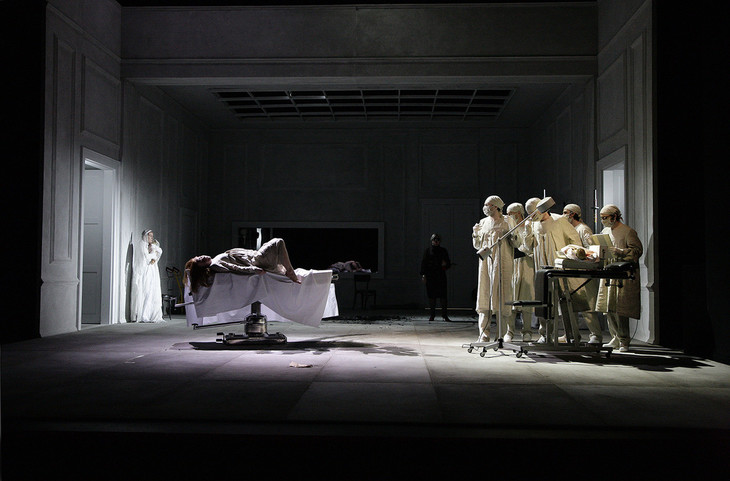Slavko Grum, Sebastijan Horvat
Goga, A Wonderful Town
Slovene family and social drama
Producer Drama SNG Maribor
Opening 19. 3. 2011 Stara dvorana, SNG Maribor
Running time 2 hours 15 minutes. No interval.
Original title Goga, čudovito mesto
Adaptation of An Event in the Town of Goga and other texts by Slavko Grum
First production
Director Sebastijan Horvat
Dramaturge Andraž Golc
Set designer Marko Japelj
Costume designer Belinda Radulović
Composer Drago Ivanuša
Lighting designer Pascal Mérat
Language consultant Janez Bostič
Make-up designer Mirjana Djordjević
Cast
Afra, Actress, Tereza Milada Kalezić
Tarbula, Grandmother, Mother Irena Varga
Elza, Nun, Lady with a child Irena Mihelič
Teacher, Silvia de Saint, Hana Nataša Matjašec Rošker
Julija, Girl with wheaten hair, Hana, Maid Mateja Pucko
Tju Ališa Kasjak Gutman as guest
Knut Larsen, Viktor Sabajev, Soldier Vladimir Vlaškalić
Madona, Young boy Kristijan Ostanek
Pietro Garelli, Old man, Father, Vajda Miloš Battelino
Vikont Le Funèbre, Head doctor, Father, Clerk Davor Herga
Doctor, Son, Grammar school boy, Student Nejc Ropret
Mute person, Waiter, Frank, Slavko Branko Jordan
After graduating in medicine, Slavko Grum (1901–1949) served as an intern at the Ljubljana mental hospital. His contact with psychopathology, when he daily "gazed into eyes inhabiting alien worlds," and his disappointment in love only increased his extreme sensitivity, his susceptibility to melancholy and depression. Deviant and schizophrenic ways of understanding the world inspired the literary works in which, just like Ivan Cankar before him, he explored the essence of the Slovenes. In An Event in the Town of Goga (1929), he employed contemporary dramatic techniques of montage and fragmentation to portray, in a novel way, the lost, lonely man in the grip of typical, urban Slovenian dangerous liaisons. Goga, a Wonderful City, directed by Sebstijan Horvat, utilizes various prose and dramatic works by Slavko Grum to describe nine hellish torture houses for lost souls and attempts to raise the question of human confrontation with the irreversible. The map of this performance takes us to the forgotten spaces of intimacy, which with its secretive homeliness interspersed with the shadows of sin, trauma, humiliation and fear, forecast an even more horrible night that awaits in the ninth circle of hell engulfed in a cold, eternal winter, where every emotion becomes frozen and the blood ceases to flow.

